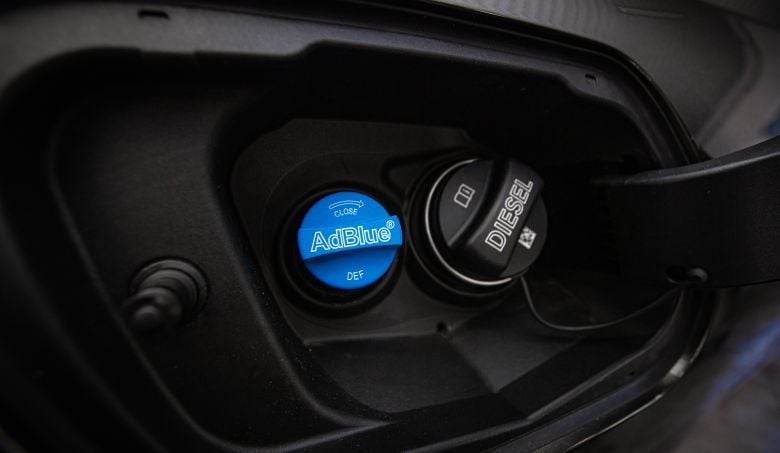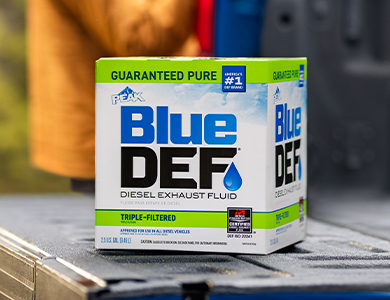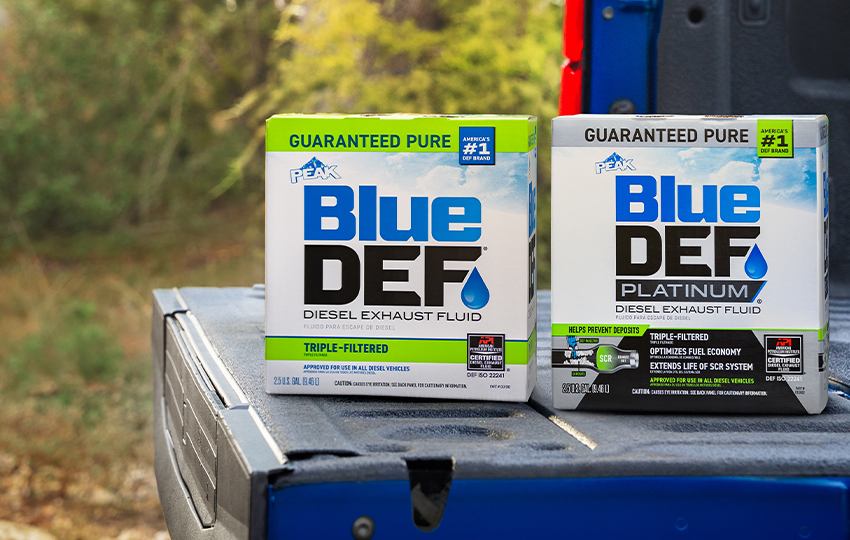
Myth Busting: 3 Misconceptions About DEF
- Vehicle Maintenance
- BlueDEF
- May 13, 2025
Learn about some of the common misconceptions about DEF.
Diesel exhaust fluid (DEF) works with selective catalytic reduction (SCR) technology to reduce harmful emissions from diesel vehicles. The Environmental Protection Agency (EPA) made SCR systems mandatory for heavy-duty vehicles in 2010, and diesel-powered passenger vehicles began using them a few years later.
If you drive a diesel-powered vehicle that was manufactured in the past 10–15 years, it likely has an SCR system that needs DEF to function. Even though DEF requirements have been around for well over a decade, misconceptions continue to cloud consumers' understanding of what DEF is, what it does, and how it does or doesn't affect your vehicle.
Let's clear up these pesky misconceptions.


What is DEF fluid?
DEF is a colorless, odorless fluid you put in a dedicated reservoir tank connected to your diesel vehicle's exhaust system. It neutralizes toxic emissions produced by your vehicle, converting them into safer chemicals before they get released as exhaust.
What is DEF made of?
Standard DEF formulations contain only two active ingredients:
- Deionized water (67.5%)
- Urea (32.5%)
Some advanced formulations, like PEAK's BlueDEF Platinum, also contain a proprietary blend of specially engineered additives manufactured according to ISO 22241 guidelines. These special additives optimize performance by protecting product quality and purity. They don't affect the standard water-to-urea ratio.
What does DEF do?
Diesel exhaust fluid works alongside your vehicle's SCR technology to interact with the raw exhaust your diesel engine generates. During that process, the urea reacts with the nitrogen oxide (NOx) byproducts your engine produces as it works.
NOx is a very harmful and dangerous chemical that contributes to climate change and environmental contamination. In humans, NOx can cause cancer, asthma attacks, respiratory diseases, and heart problems.
The chemical reaction between the urea in your DEF and the NOx in your untreated exhaust breaks NOx down into water, oxygen, and carbon dioxide. These chemicals are far less harmful, reducing air pollution and minimizing human health risks.
If you'd like to learn more about how diesel exhaust fluid works, consult this complete guide to DEF.


3 common misconceptions about DEF
People often assume that because DEF is an automotive fluid, it must be harmful. In reality, it's completely non-flammable. DEF is safe to handle and it will not cause problems if it comes in contact with unprotected skin.
Three other common DEF myths still persist in the minds of many. Let's examine these misconceptions and set the record straight:
Myth: DEF inhibits engine performance
This myth centers on the inaccurate belief that DEF negatively impacts your engine's power output, speed, and fuel economy. It is likely rooted in the fact that contaminated DEF can cause disruptions and failures in your diesel vehicle's SCR system, generating warnings and causing inefficiencies.
Another potential source of this misconception may be linked to the derating systems found in most modern diesel engines. If your DEF levels become critically low, your engine may operate at a derated output to prevent excessive NOx emissions. A derated engine generates less power, but this will only happen if your DEF levels are severely depleted or if your SCR system malfunctions.
Some drivers also have the mistaken impression that DEF is an engine additive, and therefore must impact engine performance. In reality, DEF does not interact with your engine at all. Instead, it's entirely contained in your vehicle's exhaust system.
Fact: When used properly, DEF has no impact on engine performance, efficiency, or speed. Instead, it can actually help your diesel vehicle run better.
Myth: All DEF is created equal
DEF has a standardized composition of 67.5% deionized water and 32.5% urea. Commercially manufactured diesel exhaust fluid must meet ISO 22241 specifications, which cover safety and quality control requirements for DEF production, distribution, and storage.
Given these facts, some consumers think that you can safely substitute any DEF brand for any other. After all, any DEF that makes it to market must have a standard chemical composition and meet ISO 22241 requirements … right?
Well, not quite. Here's the reality:
- Urea purity can vary widely among DEF manufacturers.
- Manufacturing and material handling standards also differ among manufacturers. When these are lax, contamination can occur.
- Trace impurities can contaminate DEF during production, negatively impacting its quality and creating a risk of mechanical problems in your vehicle.
Low-quality DEF can reduce your vehicle's fuel economy and cause problems with your SCR system, filtration systems, and/or injector nozzles. Notably, these issues can cause performance losses, tying into the misconception that DEF impedes the output capabilities of diesel engines.
Fact: Product engineering, manufacturing, and handling practices have a major impact on DEF quality. You should always choose DEF made by a company committed to the highest quality control standards.


Myth: Small amounts of contamination won't hurt DEF performance
This misconception ties into the myth that any old DEF will do. Along similar lines, there's an inaccurate perception among some consumers that concerns about DEF contamination are overstated. As such, you might not think it's important to prevent your DEF from being exposed to chemical cross-contamination or other potential sources of impurities.
Here's what can actually happen if you use DEF that's even slightly contaminated:
- Your engine's fuel injectors can clog up, causing a noticeable drop in power output and operational efficiency.
- The fuel system can become blocked, making it difficult or even impossible to start your vehicle.
- The urea in contaminated DEF can corrode metal components in your fuel and exhaust system, causing premature breakdowns or even outright failures in fuel lines, pumps, injectors, and other critical components.
Severe DEF contamination can even cause your engine to shut down completely. This can cause permanent and irreversible engine damage.
Some people also think that DEF features like proprietary additive blends and elevated purity standards are just marketing gimmicks designed to justify a higher price. In reality, these performance characteristics help you save money in the long run by enhancing your vehicle's fuel efficiency, protecting your warranty coverage, and helping you avoid costly repairs.
Fact: You should never use DEF that poses any level of contamination risk, no matter how slight it may seem.
Experience the powerful performance advantages of PEAK BlueDEF
PEAK's signature line of BlueDEF diesel exhaust fluid is made with a patented triple-filtering system that completely eliminates impurities. We like to think it's the best diesel exhaust fluid on the market: PEAK is currently the only DEF manufacturer in the world that uses this unique triple-filtered process.
Here's how the three-step process works:
- We perform rigorous treatments to deionize the water and eliminate any impurities or contaminants the water may contain.
- We then purify our urea to the same high standards.
- After combining the deionized water and urea, we put our DEF through a third round of purification and subject the finished product to close laboratory analysis before greenlighting it for packaging and sale.
Our DEF packaging also includes a specially designed pouring spout, which protects your DEF from cross-contamination and other impurities.
Learn more about what makes BlueDEF and BlueDEF Platinum.

